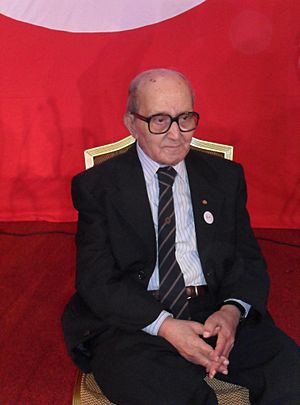Mohamed Talbi facts for kids
Quick facts for kids
Doctor of History
Mohamed Talbi
|
|
|---|---|
| محمد الطالبي | |

Talbi in 11 November 2012
|
|
| Born | 16 September 1921 |
| Died | 1 May 2017 (aged 95) Tunis, Tunisia
|
| Nationality | Tunisian |
| Education | Doctorate in History from the Sorbonne University |
| Occupation | author, professor, Islamologist |
| Employer | University of Tunis, Tunisian Academy of Sciences and Arts (2011-2012) |
| Known for | Islamic studies |
| Title | Professor |
| Movement | Islamic democracy |
Mohamed Talbi (Arabic: محمد الطالبي), (16 September 1921 – 1 May 2017) was a Tunisian, author, professor, and Islamologist.
Biography
Talbi was born in Tunis on 16 September 1921, attending school there and going on to study in Paris. Talbi wrote prolifically on a wide range of topics, including the history of the medieval Maghreb, Islam and its relationship with both women and democracy, and Islam's role in the modern world.
Talbi died in Tunis on 1 May, 2017.
Career
Talbi spent most of his educational career teaching Mediterranean and North African history. He taught the Institute of Higher Education of Tunis. In 1955, he became the first dean of the School of Letter and Human Sciences of Tunis, as well as chairing the school's history department. He later directed the scientific journal Les Cahiers de Tunisie.
In 1968, Talbi defended his Ph.D. thesis, The Aghlabid Emirate, a political History, at the Sorbonne. It was focused on Tunisia's first Muslim dynasty, addressing especially the history and key role of slavery in the Emirate’s agriculture and economy.
Talbi was appointed president of the Tunisian Academy of Sciences, Letters, and Arts between 2011 and 2012.
Views
On the subject of Islam and democracy, Talbi rejected any direct association between Shura and democracy. He argued that shura originated before Western and Islamic concepts of democracy had even developed, and that the two were not analogous . Talbi also argued that democracy as rule by the people and notions of human rights, religious pluralism, and equality under the law, embodies values which Talbi believed constituted authentic Islam.
Talbi participated in a number of interfaith dialogues with North African and European Christians, but also criticized the practice often. In a 1987 article, Talbi criticized the (at the time) current poverty of Muslim initiatives or even responses to Euro-Arab or Muslim-Christian dialogue. Talbi also explicitly declared Islam to be open to dialogue with other faiths and cultures. Talbi viewed Muslim-Christian dialogue as a significant religious matter.
Awards
| Ribbon bar | Country | Honour |
|---|---|---|
| Tunisia | Grand Officer of the Order of the Republic | |
| Tunisia | Commander of the Order of Merit | |
| Tunisia | Officer of the Order of the Independence | |
| France | Officer of the Legion of Honour | |
| Spain | Commander of the Order of Civil Merit |
Administrative positions
- Member of the Real Academia de la Historia (1970)
- Member of the editorial team of the Encyclopaedia of Islam (1978)
- Member of the Universal Academy of Cultures (1994)
- President of the Tunisian Academy of Sciences, Letters, and Arts (2011-2012)
Other acknowledgements
- Premio letterario internazionale del Mediterraneo in Italy (1979)
- The Léopold Lucas Prize in Germany (1985)
- The Cultural National Prize in Tunisia (1987)
- The Literature National Prize in Tunisia (1991)
- Hiroshima Prize for Peace and Cultural in Sweden (1994)
- The Senator Giovanni Agnelli International Prize in Italy (1997)
- Ibn Khaldun Award in Humanities (2017).


